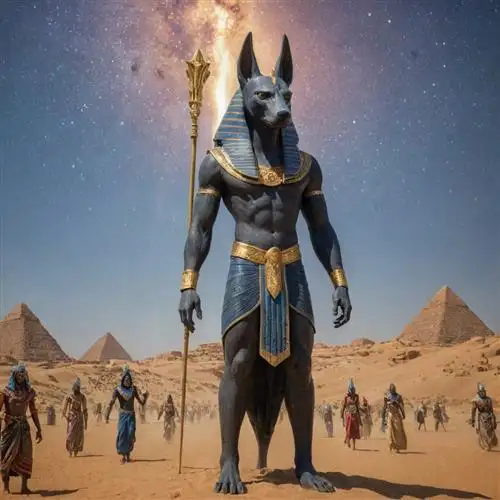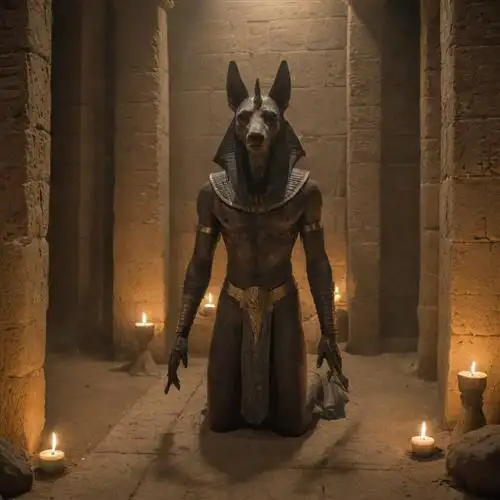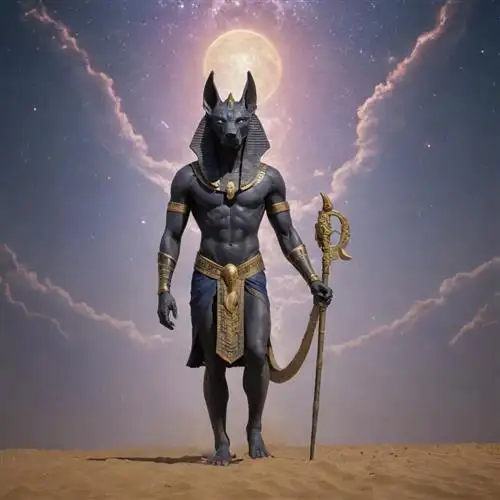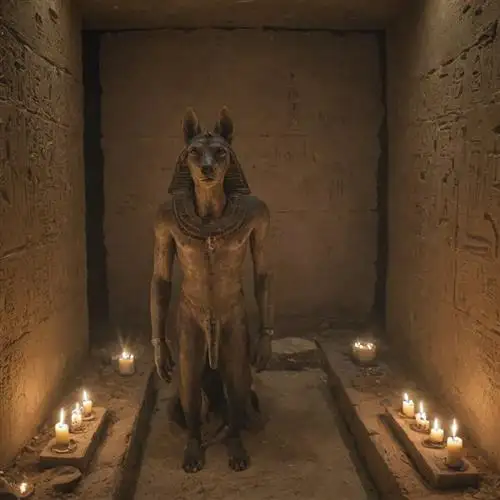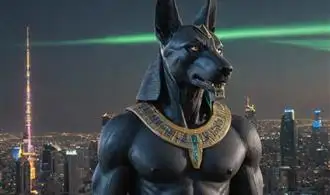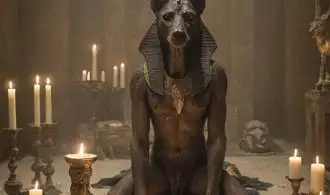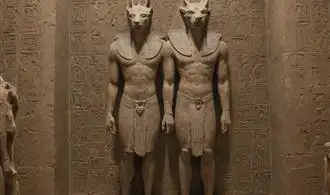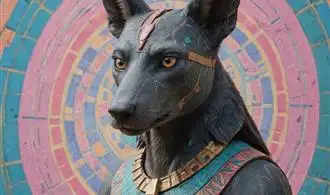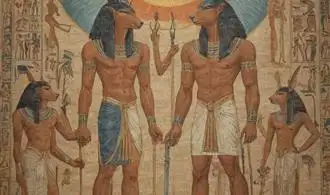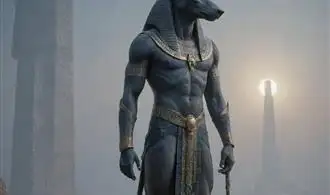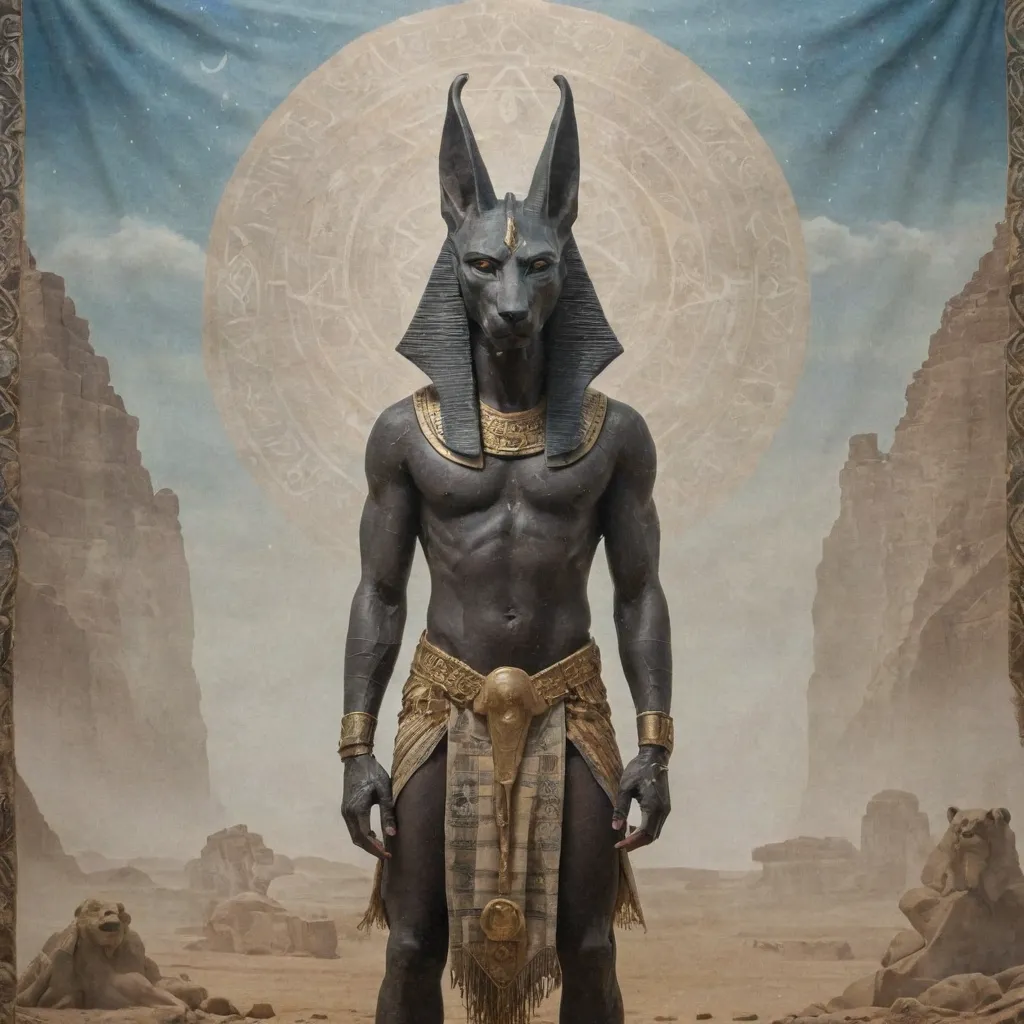
Anubis The Jackal God Revealed
Anubis, the enigmatic jackal-headed deity, has long captivated the imagination of spiritual seekers and scholars alike. As the god of the dead, embalming, and the afterlife, Anubis offers a unique perspective on the journey of the soul. Contrary to popular perception, Anubis is not solely a figure of darkness and death, but rather a complex and multifaceted deity whose insights can profoundly transform one's spiritual path.
At the heart of Anubis's mythology lies the belief that he is the guardian of the dead, responsible for guiding the souls of the departed through the treacherous realms of the afterlife. However, his role extends far beyond this traditional understanding. Anubis is also associated with the process of mummification, a practice that was deeply rooted in the Egyptian belief in the importance of preserving the physical body for the afterlife. This connection to the physical and the spiritual realms reveals Anubis as a deity who bridges the gap between the material and the ethereal, offering insights into the nature of existence and the true essence of the self.
One of the most profound aspects of Anubis's character is his association with the jackal, a creature that was revered in ancient Egyptian culture for its keen senses and its ability to navigate the liminal spaces between life and death. The jackal's role as a scavenger and its proximity to the tombs and graveyards of the ancient world have led to a common misconception that Anubis is a harbinger of doom and decay. However, a deeper understanding of the jackal's symbolic significance reveals Anubis as a figure of transformation and rebirth.
The jackal's keen senses and its ability to navigate the darkness of the night are often interpreted as metaphors for Anubis's own role as a guide and protector of the dead. Just as the jackal is adept at navigating the shadows, so too is Anubis skilled at guiding the soul through the perilous realms of the afterlife. This connection between the physical and the spiritual realms is a central tenet of Anubis's teachings, and it is this very insight that can transform one's understanding of the nature of existence and the journey of the soul.
The Secrets of Anubis Mummification Rituals
Anubis, the ancient Egyptian god of death and the afterlife, is renowned for his pivotal role in the mummification process. This ritual, which transformed the mortal body into a vessel for the soul's eternal journey, was a complex and intricate practice that held profound spiritual significance. At the heart of this process lay the secrets of Anubis, the jackal-headed deity who guided the deceased through the final stages of their earthly existence.
Central to the mummification rituals was the embalming process, which Anubis himself was believed to have established. The embalmers, known as "servants of Anubis," meticulously prepared the body, removing the internal organs and replacing them with sacred oils and resins. This process not only preserved the physical form but also imbued it with a sacred essence, ensuring the deceased's successful transition to the afterlife.
The role of Anubis within this ritual was multifaceted. As the god of the dead, he was responsible for weighing the heart of the deceased against the feather of truth, a process that determined the individual's worthiness to enter the afterlife. Anubis also guided the soul through the treacherous underworld, ensuring its safe passage to the realm of the gods.
Beyond his role as a psychopomp, guiding the dead, Anubis was also believed to preside over the embalming process itself. The embalmers would invoke his name and perform rituals to ensure his divine protection and blessings throughout the mummification journey. The intricate wrapping of the body, a critical step in the process, was thought to be a symbolic act of Anubis himself, who was believed to have wrapped the body of Osiris in linen after his murder.
The significance of the Anubis mummification rituals extended beyond the physical realm, reaching into the spiritual and metaphysical realms. The transformation of the mortal body into a mummified form was seen as a sacred act, a bridge between the earthly and the divine. The deceased, now imbued with the essence of Anubis, was believed to have the power to transcend the boundaries of mortality and join the eternal realm of the gods.
Exploring the Symbolic Significance of Anubis
Anubis, the jackal-headed deity of ancient Egyptian mythology, has long been a figure of profound spiritual significance. Far more than a mere funerary god, Anubis represents a complex tapestry of symbolic meaning that can deeply enrich one's spiritual journey. At the heart of Anubis' symbolism lies the concept of transformation - the notion that death is not an end, but a threshold to a new state of being.
One of the most striking aspects of Anubis' symbolism is his role as the guardian of the underworld. As the god who presided over the embalming process and the weighing of the heart ceremony, Anubis was seen as the gatekeeper to the afterlife. This association with the liminal space between life and death imbues Anubis with a profound sense of mystery and power, inviting the seeker to confront their own mortality and the transformative potential it holds.
Beyond his role as a funerary deity, Anubis is also closely linked to the concept of rebirth and regeneration. As the one who guides the deceased through the underworld, Anubis is seen as a facilitator of spiritual renewal and the continual cycle of life, death, and rebirth. This cyclical understanding of existence can inspire a deeper appreciation for the natural rhythm of the universe and the importance of embracing change and transition as a necessary part of the spiritual journey.
Importantly, Anubis' symbolic significance extends far beyond the realm of the afterlife. As a jackal-headed figure, Anubis is also associated with the concept of intuition, keen senses, and the ability to navigate the darkness and uncertainty of the unknown. This aspect of Anubis' symbolism can be a powerful source of guidance and inspiration for those seeking to deepen their spiritual awareness and connection to the unseen realms.
Furthermore, Anubis' role as a psychopomp, or a guide of souls, speaks to his capacity to facilitate transformative experiences and the integration of shadow elements within the psyche. By embracing the symbolism of Anubis, the seeker can learn to confront their own fears, anxieties, and hidden aspects, ultimately emerging with a greater sense of wholeness and inner balance.
Anubis and the Rituals of the Dead
Anubis, the jackal-headed Egyptian god, is far more than just a symbol of death and the afterlife. His role in the rituals of the dead reveals a complex and nuanced understanding of the transition from this life to the next. At the heart of these rituals lies a profound respect for the deceased, a belief in the importance of proper preparation for the journey to the afterlife, and a deep reverence for the divine forces that guide the soul's passage.
One of the most significant rituals associated with Anubis is the mummification process. As the god responsible for embalming and preserving the dead, Anubis oversaw the meticulous preparation of the body, ensuring that it was ready to house the soul in the afterlife. This process was not merely a practical endeavor; it was a sacred rite that connected the physical and spiritual realms, allowing the deceased to maintain their identity and essence even in the afterlife.
The rituals of the dead also involved the careful placement of amulets, talismans, and other symbolic objects within the tomb. These items were believed to provide protection, guidance, and even sustenance for the deceased as they embarked on their journey to the afterlife. Anubis, as the guardian of the necropolis, played a crucial role in ensuring the safety and well-being of the departed soul.
Another important aspect of Anubis' role in the rituals of the dead was the weighing of the heart ceremony. In this ritual, the deceased's heart was weighed against the feather of Ma'at, the goddess of truth and justice. If the heart was found to be pure and true, the soul was allowed to pass on to the afterlife. Anubis, as the psychopomp, or guide of souls, was responsible for overseeing this crucial judgment, ensuring that the deceased were worthy of eternal life.
The rituals of the dead were not simply a means of honoring the departed; they were a way of ensuring the continued well-being and prosperity of the living. By properly caring for the dead, the living ensured the continued protection and guidance of the divine forces, including Anubis, who was believed to intercede on behalf of the deceased in the afterlife. This reciprocal relationship between the living and the dead was a fundamental aspect of ancient Egyptian spirituality, and Anubis was at the heart of this belief system.
Discovering the Lasting Legacy of Anubis
Anubis, the enigmatic jackal-headed deity of ancient Egyptian mythology, holds a profound and multifaceted legacy that continues to captivate spiritual seekers today. Beyond the iconic imagery, Anubis represents a complex tapestry of symbolism and esoteric wisdom that can transform one's spiritual journey in unexpected ways.
At the heart of Anubis' enduring influence lies his role as the guardian of the dead, responsible for guiding the deceased through the treacherous underworld and ensuring the proper preservation of the body. This custodial function, however, extends far beyond the physical realm, as Anubis is also revered as a psychopomp – a being that facilitates the transition of the soul from the material world to the spiritual realms.
One of the most profound insights that Anubis offers is the concept of duality and balance. As the protector of the mummification process, Anubis represents the delicate equilibrium between life and death, the visible and the unseen. This profound understanding of the cyclical nature of existence can inspire a deeper appreciation for the interconnectedness of all things, encouraging a more holistic approach to spiritual growth and personal transformation.
Furthermore, Anubis' association with the judgment of the dead, as depicted in the famous weighing of the heart ritual, speaks to the importance of self-reflection and accountability in one's spiritual journey. This archetypal image serves as a powerful reminder that true enlightenment requires the courage to confront one's own shadows and shortcomings, ultimately leading to a deeper understanding of the self and the divine.
Beyond these symbolic interpretations, the legacy of Anubis also manifests in the rich tapestry of ancient Egyptian mysticism and occult practices. As a deity closely linked to the underworld and the afterlife, Anubis is often invoked in rituals and meditations aimed at accessing the deeper realms of consciousness, facilitating connection with ancestral wisdom, and cultivating a profound sense of mystical understanding.

